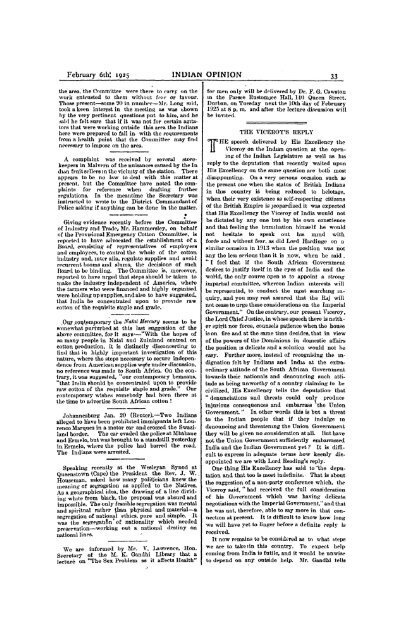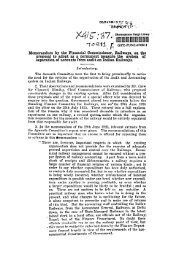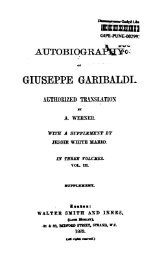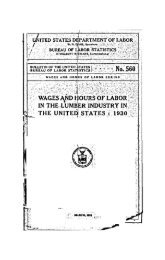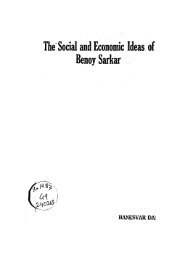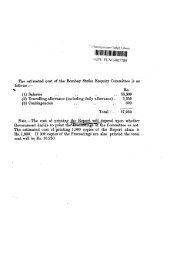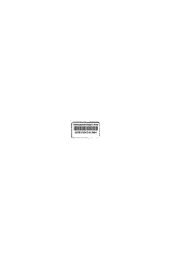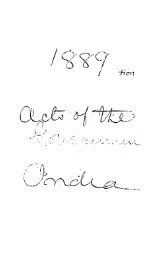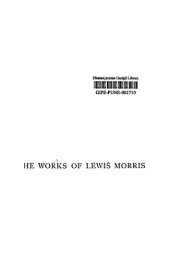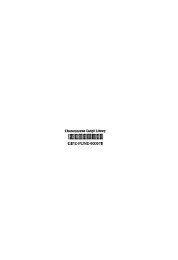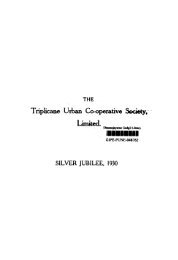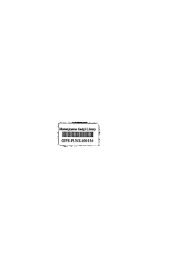Create successful ePaper yourself
Turn your PDF publications into a flip-book with our unique Google optimized e-Paper software.
February 6th: 1925 INUIAN OPINION 33<br />
the area. the Committee were there to ('arrr on the<br />
work entrusted tD them without [plH' or tavour.<br />
Those present-some!)O in numbpr-Mr. Long said.<br />
took a keen inter~8t in the meeting Ill! was bhown<br />
by the very pertinent questions put to him. and be<br />
~ai.l he felt sure that if it was not for certain agItators<br />
that were working outside this area the Indians<br />
here were prepared to fall in with the reqmrementB<br />
from a health point that the Committee may fin.L<br />
ne('t'88ary to impose on the area.<br />
A complaint was received by several storekeepers<br />
in Malvf'rn of the nuisances caused by the In<br />
dIem fruit sellprs In the vicimty of the station, There<br />
appears to be no law to deal with this matter at<br />
prespnt. but the Committee have noted the complaints<br />
for reference when drafting fllrther<br />
regulations. In the meantime 'the Secretary was<br />
instructed to wrIte to the District Commandant of<br />
Police asking if anything can be done in the matter.<br />
---- .<br />
Giving evidence recently before the Co~ittee<br />
of Intlulltry and -Tradel Mr. Hammersley. on behalf<br />
of the PrOVIsional Emergency Cotton Committee. is<br />
reportf'rl to have advoeated the estahliRhment of a<br />
BoarJ, consillting of "eprpflentatives oC employers<br />
and employeefl, to control the whole of thp cotton<br />
industry and, mter alia. regulate supplies and avoid<br />
r(,Cllrrent booms and fllllms, the decisions of such<br />
Boarfl to be binding. The Committee is, moreover,<br />
reporterl to have urged that steps should be taken to<br />
make the industry independent of America. where<br />
the tarmers who were financed and highly organised<br />
were holding up supplies. and also to have suggested,<br />
that India be concentrated upon to provIde raw<br />
cotton of th-e reqlliflite staple and grade.<br />
,Our ,cot}t~m_porary the Natal AfercuT!I seems to he<br />
flomewhat purturbed at this last suggestion of the<br />
above committee. for it says'-"With the hopes of<br />
80 many people in Natal and Zululand centred on<br />
cotton production, it is distinctly 4isconcerting to<br />
find that in highly important investigation of this<br />
nature, where the steps necessary to secure indepenclE-nce<br />
from American supplies wrte under discussion.<br />
no reference was made to South Africa. On the eontrary,<br />
it was suggested, "our contemporal'Y bemoans,<br />
"that India flhonld 1;.>e concentrated upon to provide<br />
raw cotton of the reqnisitp staple and grade." Our<br />
rontemporar)- wishe:; somebody hall been there at<br />
the time to advertise South African cotton !<br />
Johannesburg Jan. 20 (Reuter).-Two Indians<br />
alleged to liave been prohibIted immigrants left Lourenco<br />
Marques in a motor car and crossed the Swaziland<br />
border. The car evaded the police at Mbabane<br />
and Ermelo. but was brought to a standstill yesterday<br />
in Ermelo. wh('re the police had barred the road.<br />
The Indians were arrested.<br />
Speaking recently at the Wesleyan Synod at<br />
Queenstown ~Cape) the President the Rev. J. W.,<br />
Houseman, asked how many politicians knew the<br />
meaning of segrag8tion as applied to the Natives.<br />
As a geographical idea. the drawing of a line dividing<br />
whIte from black, the proposal was absurd and<br />
impossible. The only feasible segregation was mental<br />
and spiritual rathE-r than physical and material-a<br />
segregatioll of national ethics, pure and simple. It<br />
was the segree,rahtm' of nationality which needed<br />
preservation-working out a national destiny on<br />
national lines.<br />
We are informed by Mr. V. Lawrence, Hon.<br />
Secretary of the M. K. Gandhi Library that a<br />
lecture on "The Sex Problem as it alIects Health"<br />
for men only will bf' dl'livered by Dr. F. G. Cawston<br />
10 the Parsee RnstomJee Han. HI) Queen Street.<br />
Durban. on Tuesday next the 10th aay of February<br />
1925 at 8 p. m. and after the lecture difK'ussion will<br />
be inVIted.<br />
THE VIC'EROY'S REPLY<br />
~ HE speech delivered by His Excellency the<br />
II \"iceroy on the Indlan question at the openlUg<br />
of the Indian I,egis13tul'e as well as hIS<br />
reply to the deputation that recently waited upon<br />
His Excellency on the same qnestion are both most<br />
,disappomting. On a very serlOus occasion such as<br />
the present one when the status of British Indians<br />
in thIS oountry is being reduced to helotage.<br />
when their very existence as self-respecting citizens<br />
~f the British Empire is Joopardized it was expected<br />
that His Excellency the Viceroy of India would not<br />
be dictated by anyone but by his own constience<br />
and that feeling the hmmbation himself he wonld<br />
not hesitate to speak out hIS mind with<br />
force and without fear. as did Lord Hardinge on a<br />
similar occasion in 1913 when the position wa.~ not<br />
any the less serious than it is _now, when he said,<br />
"I feel that if the South African Government<br />
desires to justify itself in the eyes of India and the<br />
world, the only conrse open IS to appoint a strong<br />
impartial committee. whereon Indian mterestB will<br />
be represented, to conduct the ll\.Ost searcbmg inquiry,<br />
and you may rest assured that the Raj will<br />
not cease to urge these considerations on the Imperial<br />
Government." On the contrary, our present VIceroy,<br />
the Lord Chief Justice, in whose speech there is neither<br />
spil;it nor force, counsels paiJence when the house<br />
'ison fire and at the same time decides, that in view<br />
of the powers of the Dominions in domestic affairs<br />
the position IS delicate and a solution would not be<br />
easy. Further more. instead of recognifling the llldignation<br />
felt by Indians and Indicl at the extraordinary<br />
attitnde of the South African Government<br />
towards their nationals and denouncing such attitude<br />
as being unworthy of a country claiming to be<br />
civilized, His Excellency tells the deputation that<br />
.. denunciations and threats could onlf produce<br />
injurious consequences and embarrass the Union<br />
Government." In other words this is but a threat<br />
to the Indian people that if they indulge In<br />
denouncing and threatemng the Union Government<br />
they will be given DO .consideration at alL But have<br />
not the Union Government sufficiently embarrassed<br />
India and the Indian Government yet? It is difficult<br />
to express in adequate terms how keenly disappointed<br />
we are with Lord Reading's reply.<br />
One thing His Excellency has said to the deputation<br />
and that too is most indefinite. - That is about<br />
the suggestion of a non-party confvrence which, the<br />
Viceroy said, .. had rec('ived the full oonsideration<br />
of his Government which was having delicate<br />
negotiations with the Imperial Government," and that<br />
he was not, therefore, able to say more in that connecbon<br />
at present. It is difficult to know how long<br />
we will have yet to linger before a definite reply is<br />
received.<br />
It now remains to be considered ail to what hteps<br />
we are to take lin this country. To expect help<br />
coming from India is futile, and it would be unwise<br />
to depend on any outside help. Mr. Gandhi tells


